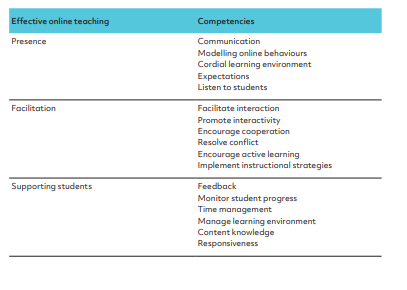2.4 What are the competencies of an online educator?
In the #Openteach report on the literature around online teaching: Teaching online is different: perspectives from the literature we looked in detail at the competencies of an online educator, a synopsis of the key literature is presented in this section (Ní Shé, Farrell, Brunton, Costello, Donlon,Trevaskis, Eccles, 2019).
An early study on the characteristics of effective online educators was Chickering and Gammon (1987) who distilled seven principles for good practice in undergraduate education and their implementation in technology enhanced education. These principles are: (1) encourage student-faculty contact; (2) encourage cooperation among students; (3) encourage active learning; (4) give prompt feedback; (5) emphasise time on task; (6) communicate high expectations; (7) respect diverse talents and ways of learning (Gorsky & Blau, 2009).
To some extent these characteristics are summarised in the quote from Gorsrky and Blau (2009), “teaching effectiveness may be defined as how an instructor can best direct, facilitate and support students toward certain academic ends, such as achievement and satisfaction” (p. 1). In their study, Gorsky and Blau (2009) compared two instructors’ facilitation of an online course using the Community of Inquiry (CoI) model as a research framework. They found that the instructor who was most highly rated by the students had a greater teaching and social presence and a faster response time. Timely responses by educators in all aspects of the teaching and learning process leads to better outcomes (Martin, Ritzhaupt, Kumar, & Budhrani, 2019). According to Coker (2018) student engagement and interaction needs to be supported to ensure effective facilitation of online courses.
Much of the literature on the competencies required by an online educator refers to the functions or skills required to complete a specific role. Abdous (2011, 2011, p. 64) used the definition of competency as being the “knowledge, skills, ability, and attitudes required to effectively perform roles”. Competencies are intrinsically linked to roles. Goodyear et al. (2001) documented roles, the main tasks associated with each role and the competencies required to carry out those tasks. However, the literature on roles and competencies considers that competencies are context specific or socially situated (Alvarez et al., 2009; Baran et al., 2011; González-Sanmamed et al., 2014). In addition, educators may share responsibility for the delivery of the online course with other staff such as instructional designers, and thus need not necessarily be skilled in the associated competencies (Alvarez et al., 2009; Baran et al., 2011).
From the literature, we distilled the following competencies:
Competencies for effective online teaching.
| Feature | Effective online teaching | Competencies |
| Social Presence | Encourages student-faculty contact which establishes presence that will encourage a supportive learning community (Chickering & Gamson, 1987; Dunlap & Lowenthal, 2018; Edwards et al., 2011). | Communication skills, written and oral; modelling of good online behaviour; maintain a cordial learning environment. |
| Facilitation | Encourage cooperation among students. | Promoting interactivity within the group; facilitation of interaction; managing group work and building communities; advising/counselling skills; facilitating participation among students; resolving conflict in an amicable manner. |
| Supporting students | Encourage active learning which supports students success and becoming a more agile educator (Chickering & Gamson, 1987; Dunlap & Lowenthal, 2018). | Creates and facilitates novel reflective pedagogically sound activities; utilises teaching strategies/models and general education theory; Uses internet tools for instruction; accesses various technological resources; selects the appropriate resource for learning; suggest resources to the students. |
| Supporting students | Gives prompt feedback and timely responses which supports students success (Chickering & Gamson, 1987; Dunlap & Lowenthal, 2018; Martin et al., 2019). | Provides opportunities to perform and receive feedback; monitors individual and group progress; assesses individual and group performance; Suggests measures to enhance performance. |
| Facilitation | Emphasise time on task. | Time manage activities to provide student time efficiencies; Manages the time and course; Establish rules and regulations. |
| Facilitation | Challengers, communicates high expectations, which will provide clarity and relevance (Chickering & Gamson, 1987; Dunlap & Lowenthal, 2018; Edwards et al., 2011). | Creates significant real life problems with rubrics for guidance; demonstrates commitment and favourable attitude; sustains students’ motivation, demonstrates leadership qualities; establishes rules and regulations. |
| Supporting students | Affirmers, respects diverse talents and ways of learning and provides clarity and relevance through course structure and presentation (Chickering & Gamson, 1987; Dunlap & Lowenthal, 2018; Edwards et al., 2011). | Acknowledges when students are succeeding in their work and treat them with respect; provides different types of learning activities; addresses universal design for learning (UDL) principles in all created materials; comply with ethical and legal standards; suggests measures to enhance performance; provide guidance based on student needs. |
| Teaching Presence | Administering the online learning environment(Metz & Bezuidenhout, 2018). | Managerial skills; structures online learning resources so materials are one click away. |
| Cognitive presence | Content expert which provides clarity (Dunlap & Lowenthal, 2018). | Content knowledge; library research skills; undertakes efforts to update knowledge; suggests resources to the students; conducts research on classroom teaching; interprets and integrates research findings in teaching. |
#Openteach competencies for effective online teaching
Drawing on the literature discussed above, the #Openteach project emphasizes three key elements for effective teaching online:
- Presence
- Facilitation
- Supporting students


Feedback/Errata